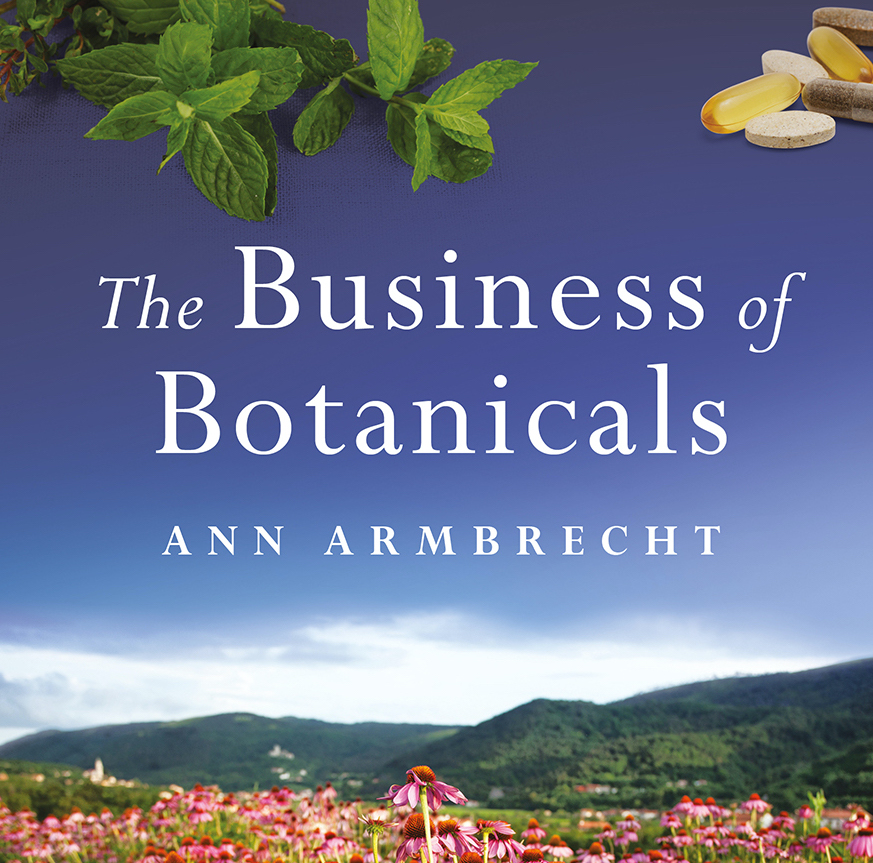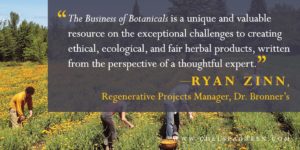by Ann Armbrecht
The Social Good team at Traditional Medicinals (TM) organized a 3-month book club to discuss the themes explored in SHP Director, Ann Armbrecht’s book, The Business of Botanicals: Exploring the Healing Promise of Plant Medicines in a Global Industry. Ann spoke with Hannah Scott, Impact Communications Manager at Traditional Medicinals Foundation (TMF), about their experience.
Understanding What’s At Risk
“Our ulterior motive was to have people understand the importance of the work in Social Good and why our work defining our purpose and articulating our values and core beliefs is so important. We wanted everyone to understand why sustainability and why working in our source communities is valuable.”
“We also wanted to spend time looking back at the early days of the company to make sure that we’re aligning in the right direction.”
Hannah continued, “We wanted to help people see that they don’t just work in procurement or marketing, that we all work in this industry together. And so it is important for us all to understand what’s at risk, potentially, in this industry.”
“Your book tied together why if we want the herb industry to continue to grow and provide this level of botanical wellness to people, we have to ensure that it is sustainable.”
“It’s easy to get lost in our own silos. The book club offered a way to step back and remember the impact that we’re having. We all know about sustainability as word, that we need to recycle and all of that, but I think people forget about the fragility of the herbal supply chain. And that was very helpful to come back to in your book.”
Book Club Structure
Hannah explained that the Social Good team divided the book into different sections. They identified themes and then invited people within the company to talk about those distinct areas. They handed out copies of the book to anyone who was interested and sent out discussion questions in advance. People didn’t have to sign up to get a book nor did they have to read to come to the book club. Hannah told them they’d learn something anyway and to just come. The sessions, held during lunch hour, were voluntary. Between 30 to 50 people typically joined. Though no one from production joined the book club, the Social Good team left extra books at the front desk at the production site for anyone who wanted a copy (and all were taken).
Discussion Topics
Intro and Chapter 1: Supply, Quality, and Relationship
Jamie Horst, Chief Purpose Officer, opened the book club by focusing on the complexities of the botanical industry, on potential scarcity of raw materials, and the impacts of climate change on the communities they’re working with. They included the Sustainable Herbs Program video, What is Sustainable Herbalism? as part of this section.
Chapter 2: The Colonial Legacy and The Botanical Industry
Co-founder, Drake Sadler spoke about the early days of the industry, about starting TM with Rosemary Gladstar, and about the history of the company. This section discussed tensions in the industry, the disconnection between interacting with the joy of plants and what it takes to source at the scale needed for demand.
Chapter 4: Quality and Relationships in the Botanical Industry
Katie Huggins, Vice President of Technical Services, talked about how TM ensures that the pharmacopeial medicinal quality of the plant is strong. How do they keep it that way? When the plant changes hands many times, travels thousands of miles, how do they know that the herb is the correct species?
Katie also talked about the importance of TM’s relationship at the source. She described how those relationships impact the quality and how they help TM figure out and solve problems. And she talked about the challenges of maintaining those relationships as TM has grown.
“Quality is an area that I think people think they know.” Hannah said. “But for the most part most of us really don’t understand all the dimensions of our quality department. Katie’s discussion helped us understand that.”
Chapter 6 and 10 Relationships as a Business Strategy
Josef Brinckmann, Research Fellow, Medicinal Plants and Botanical Supply Chain, talked about why it’s in TM’s business interest to build relationships based on trust and respect. He talked about farmers, regenerative farming, and biodiversity. He talked about how wild plants don’t obey needs and schedules like domestic plants, how farmers cultivate wild plants, and how they are dealing with changing and inconsistent weather patterns. They discussed the climate challenges that farmers are now facing and what that means long term for TM’s procurement. Josef talked about the complexities behind and challenges of the FairWild certification and about the potential damage to ecosystems from over harvesting.
“This discussion really had an impact,” Hannah said. “Especially for the new employees who are coming in, I felt this constant sense of ‘Oh, I didn’t know that.’”
Chapter 9 Supply Communities
Nioma Sadler, Co-Founder, Traditional Medicinals Foundation, talked about TMF’s work in Rajasthan and other supply communities, some of the challenges they had, and how to make sure they are supporting the organizations with whom they partner. She talked about fair trade standards and premium funds. Hannah elaborated, “We talked about how to work in a community with so much need, when to decide that your work is done? And we talked about the seasonality of FairWild work and how it can provide a reliable source of income. We also talked about how a community will be impacted if suddenly that source of income is gone because we as a company stop using that botanical. This discussion helped TM staff feel connected to these communities and see the value of our work there.”
Chapter 3 and 5 Scaling Responsibly
Josef Brinckmann spoke again, this time focusing on how to ensure that plants are not over harvested. Hannah summarized, “What are other unsustainable practices that come with harvesting herbs or commerce? How do we create a model that shows it’s possible to maintain a connection between people and plants even as we continue to scale up our production? He talked about the role of certifications. In preparing for this section, we spent time thinking about what questions would help people think about TM’s growth in the context of its impact on the planet and people.”
Chapter 7 and 8 TM’s Growth Strategy
Jamie Horst and Blair Kellison, Chief Executive Officer, discussed how TM grows herbs on the scale needed to meet the demand at a price point that allows it to be viable for the collector and farmer. “As an herbal wellness company, how do we work with regional politics, climate change, war zones, the change of regimes corruption, etc.? While knowing all of that and trying to meet those challenges, how do we counter the competitors who are bringing lower quality herbs with correspondingly lower prices?”
In their discussion, they focused on how to set goals to make sure they are staying in line with their purpose while continuing to grow.
Chapter 11 Writing The Business of Botanicals
I, Ann Armbrecht, joined the book group for the final session to talk about her vision and experience of researching and writing the book and her work at the Sustainable Herbs Program, and to ask additional questions.
What the Book Club Accomplished
“People are still talking to me about the book club,” Hannah said.
“I think the biggest takeaway was that connection back to why they decided to work at TM.
Most of us care about wellness and most care about the planet and people. This book helps articulate why it’s so hard to do what we do. Sometimes it feels really challenging to work at TM. It feels like there are so many components that everyone’s trying to think of. And this book made us all feel a little bit less alone and less isolated in that struggle.
It helped us remember that what we do is hard. And that we are part of a bigger industry where other people are sharing some of our struggles. In the end it was inspirational. It helped us see that there are things we can do that will help us make a difference in the world. It’s not impossible to keep producing herbal wellness and not harm the planet along the way.”
Zoe Kissam, Director of Innovation, said she needed that kind of reinvigoration. She deals with supply and quality issues in new products and marketing and is at the epicenter of all of those pressures. She told Hannah, “I thought I knew this industry really well. And this book still showed me so much, so many things I didn’t know.
“The journey into herbalism is very personal and really hard to explain. The Business of Botanicals articulates this journey in a way that I had never thought of before, really bringing to life the intricacies, challenges, and opportunities in the industry. Ann’s work validates the challenges I touch every day in my work in innovation and offers ways to communicate these challenges from a fresh perspective and inspires me to think about sustainability into the future.”
Connecting with Why This Work Matters
I asked Hannah if she had any final comments or reflections.
Hannah said, “Putting time into educating your employees or allowing them the opportunity to have access to resources like this book and the opportunity to discuss it is invaluable. It’s not just about understanding a little more about their job or the complexities. Now they are engaged with these ideas. And they’re engaged with each other. They’re asking critical questions that might start to slip out of focus in their day to day. It’s kind of like anything; when you step back and you evaluate the landscape, you remember your role in that and why it matters.”
“There’s the educational piece, which is always great. And then there’s the emotional connection of reminding them why they’re doing this work and connecting them to the industry and the challenges.”
“We felt like we’re not alone, that we’re part of this bigger industry. And in the way you did it, intertwining all of these stories, it feels less like other companies are competitors and more like we are all part of this. There is a finite quantity of botanicals. We are together on this journey of caring for the plants and the planet. And it’s up to all of us to make sure that there’s enough for everyone, and to make sure we’re using these herbs as responsibly as we can. And to challenge each other by rising up.”



Comments